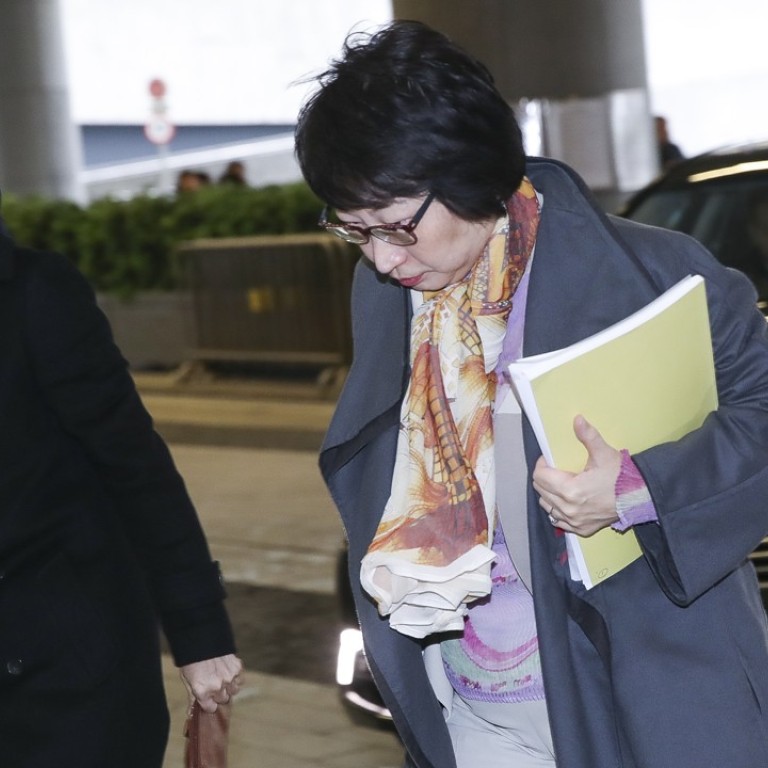
Letters to the Editor, February 8, 2018
How to prevent repeat of illegal structures row
Make it mandatory for all Hong Kong civil servants above a certain rank to publicly disclose all their involvements in any property, either under their own name, a company name, an offshore company name or any close family member. Failure to do so would result in automatic prison time of two years.
In this way, we will be able to see up front who owns what property and what illegal structures, if any, are placed on that. We will then not have to go through the drama that we have been witness to, over the 2012 chief executive elections and now the appointment of the secretary of justice.
Maybe it is time for influential people to talk to Beijing to set for Hong Kong the same rules that apply in the rest of China, and that is: only locals can buy.
Outsiders who want to buy should have a proven track record of living and working in Hong Kong for a certain number of years and must be tax payers.
Residential property cannot be held in company name, and any property which is currently under company name should be put under the individual name of a Hong Kong citizen or resident with a proven track record
As far as the right to a plot of land for a village house goes, if that cannot be abandoned, then there should be stricter regulations. An applicant must show that he was born in Hong Kong, and had lived here for the 18 years previous to applying for his “entitled” plot.
The plot of land has to be returned to the village (at cost without profit) if he decides to migrate or live the major part of the year outside Hong Kong. Also, the house built on such as plot would be only for self use and not allowed to be (even partially) rented out or sold.
Jeffry Kuperus, Clear Water Bay
Is the pressure getting to young parents in city?
I am deeply troubled at the reports of child abuse, apparently perpetrated by their own parents.
“Spare the rod and spoil the child” was the maxim that guided most child rearing in the past. The older generation would use strict rules and corporal punishment to nurture and instruct children. They genuinely believed physical punishment was the best way to instil discipline. Many young parents just follow such traditional Chinese models. But more than questioning parenting techniques, perhaps it is time we tried to find out what is making some parents react with violence.
Many unprivileged families in Hong Kong face livelihood issues. Some have been waiting years for public housing and can only afford partitioned flats with poor living conditions. Some parents struggle to afford daily expenses and education costs. This means more work, longer hours and a lack of rest. Pressured parents could vent by hitting and shouting at their children. Poor spousal relationships can also take a toll.
Many people have called for legislation to ban corporal punishment. But legislation can only punish those responsible after the event, it can’t really protect children from abuse.
Greater social awareness of abuse and children’s rights, promotion of warm family ties, and a commitment to improving living conditions could be a start.
Wong Lok-yi, Yau Yat Chuen
Creative sector needs push to power economy
With the Hong Kong budget due to be delivered in just over two weeks’ time, I am reminded of the recent calls for the government to give young creative professionals a chance to pursue their dreams.
Young creative entrepreneurs have long been urging the government to better support the industry. Many talented professionals, – from photographers to artists and designers to musicians – struggle to make ends meet or give full play to their talent.
The reasons are the high costs of living, including sky-high rent, production and venue costs, and a difficult economy. Creative entrepreneurs still face major social, financial and cultural barriers to success, despite being hailed as key to driving the city’s economy into the future.
Chief Executive Carrie Lam Cheng Yuet-ngor has pledged to boost the creative sector, especially with the city losing ground on its traditionally strong retail sector. The government acknowledges that the creative industries “help to increase the innovation capacity of the economy and can be a powerhouse for future economic growth”.
One way to help could be to set up performance-linked subsidy schemes for creative professionals. If they can meet the targets set by the government each month, they should receive rent subsidies for the following three months.
Also, secondary schools could be supported to provide more resources for talented students to enhance their interest in the creative industry, such as for workshops or internship programmes.
Daniel Hui, Tseung Kwan O
Trudeau killed off ‘mankind’ in nod to liberals
Political correctness is a capitulation to liberal fantasies, often in defiance of commonsense.
To correct a speaker for using a term – mankind – when everyone knows that the word is inclusive of all genders, is the epitome of foolishness. But it will no doubt garner praise from all who breathe the rare bubble air of those who hold glasses of chilled Chardonnay with an extended pinky.
Paul Bloustein, Ohio, US

